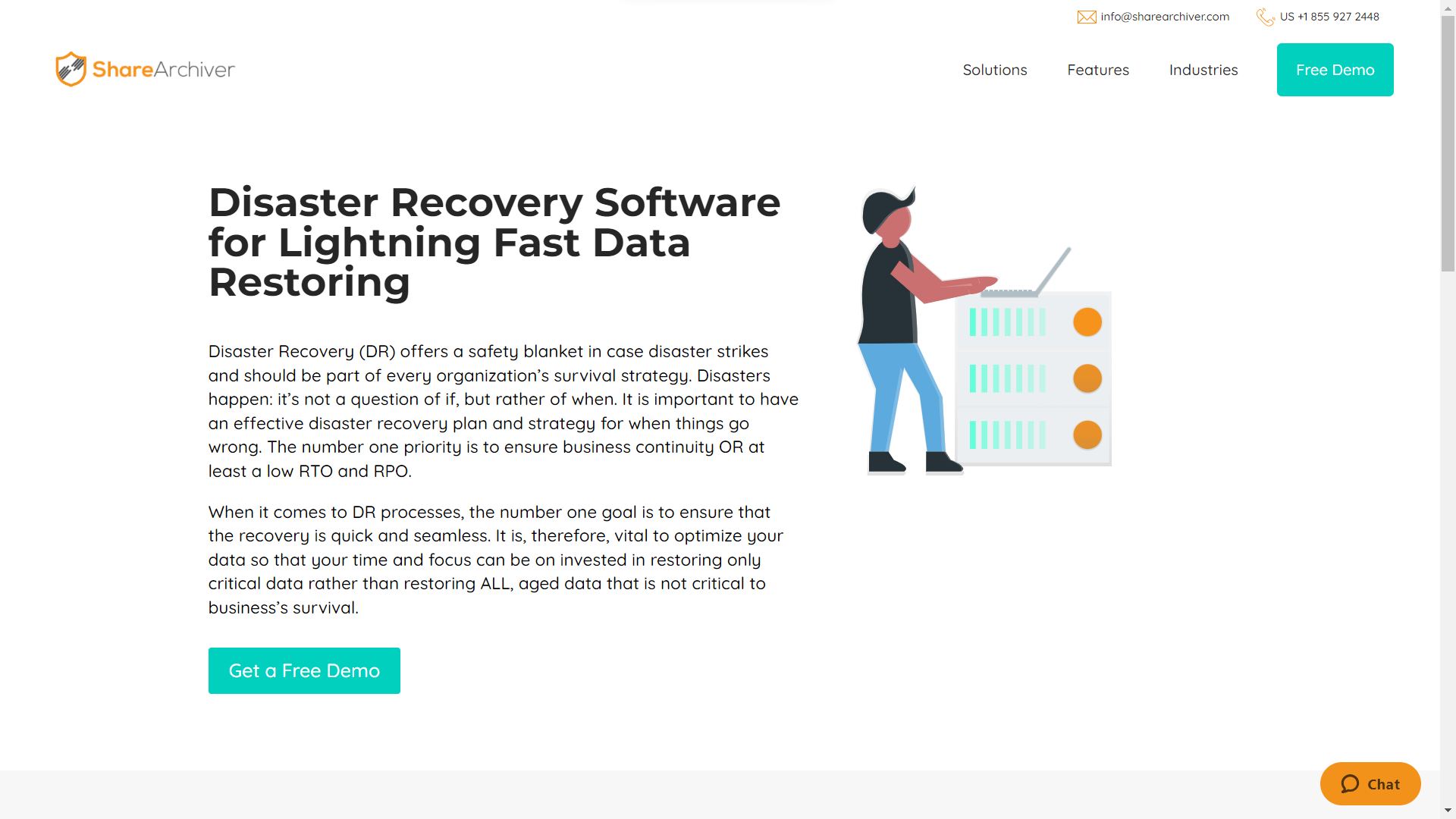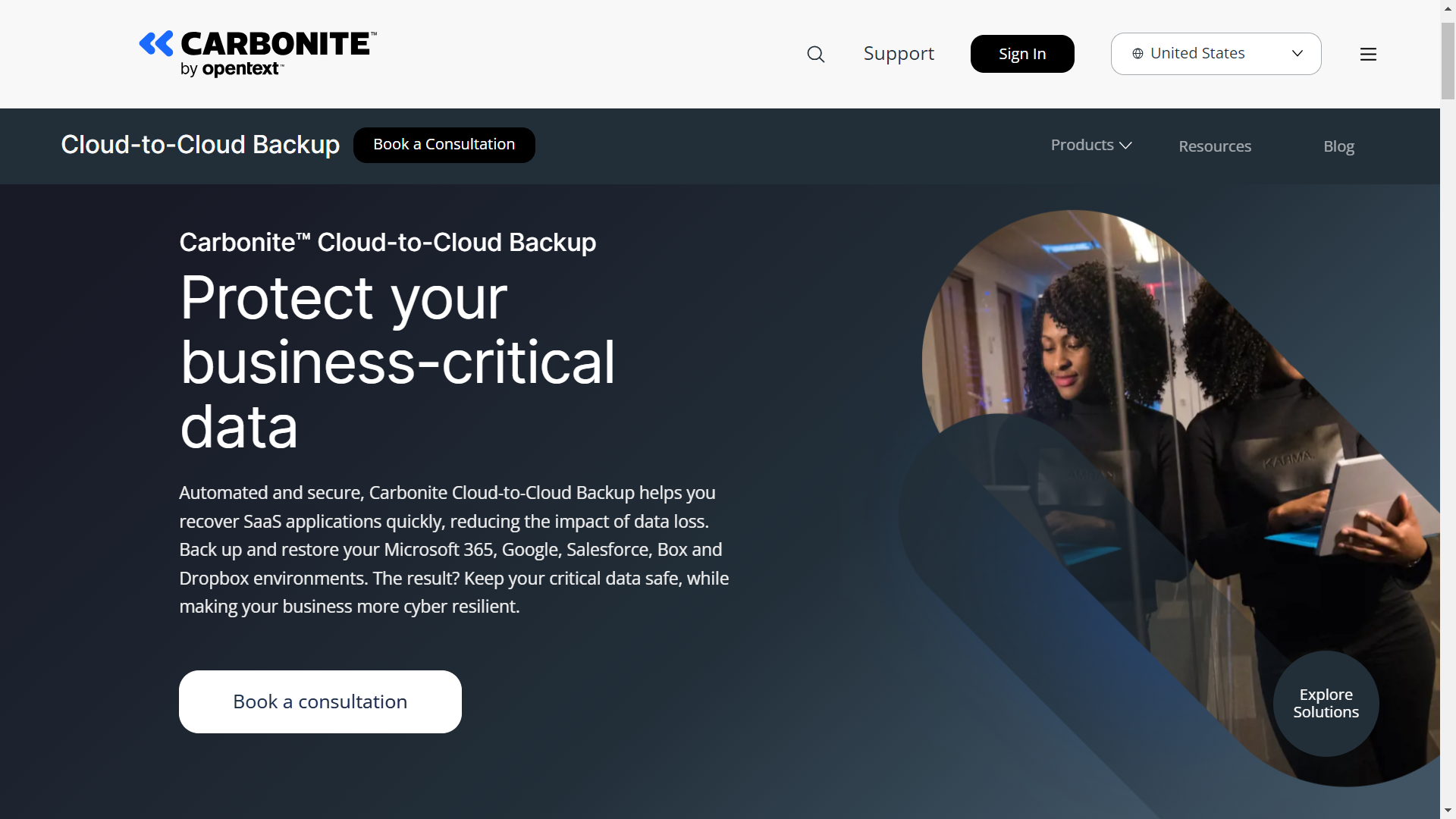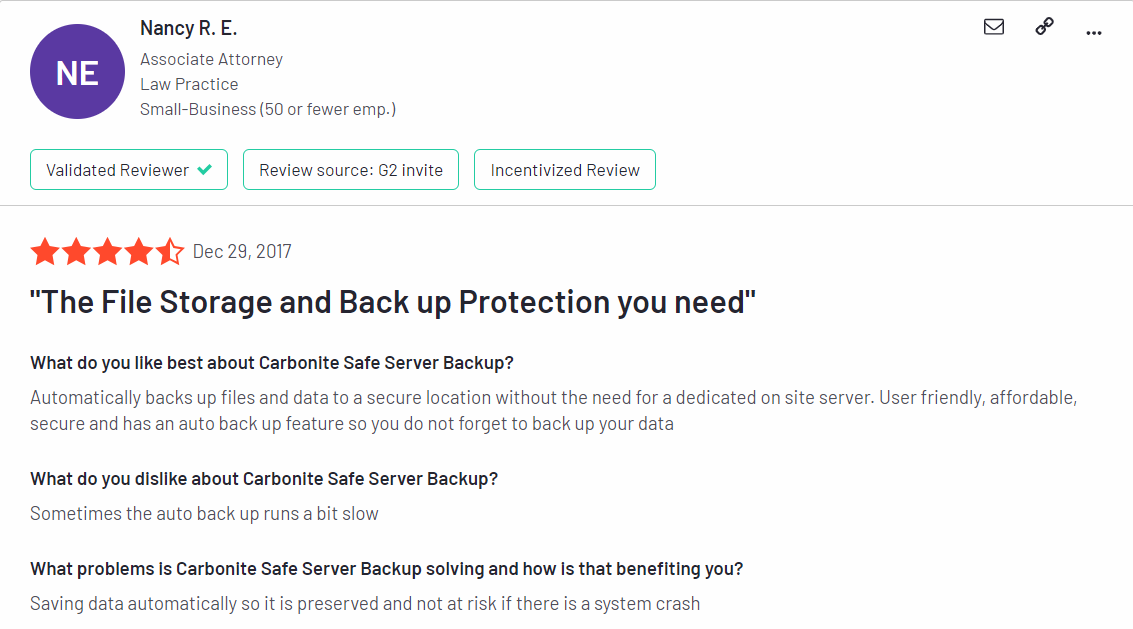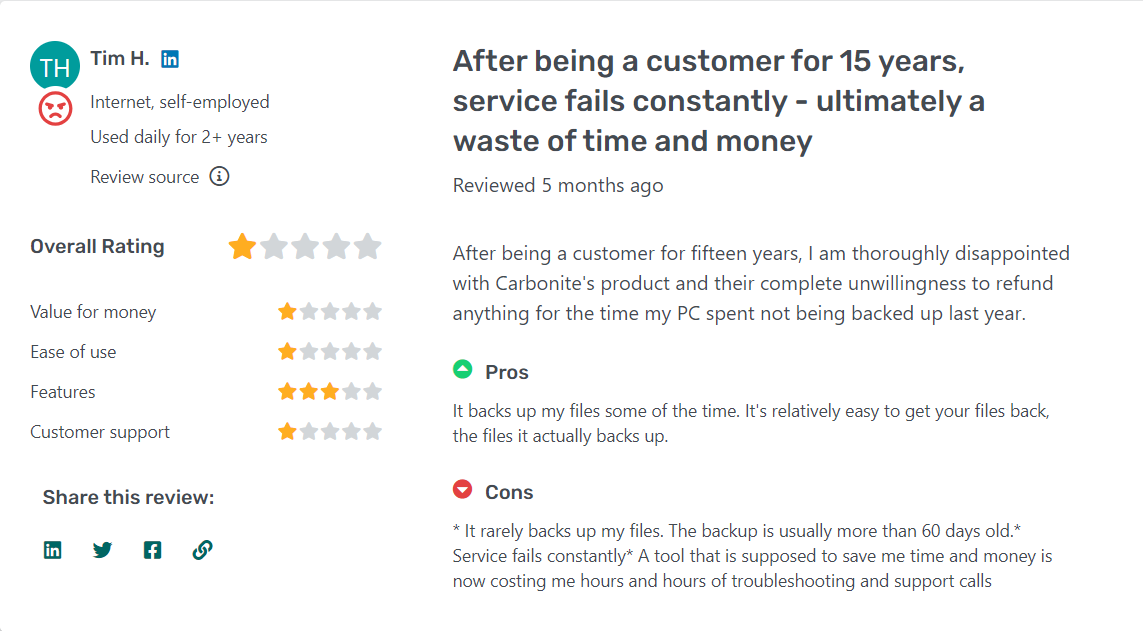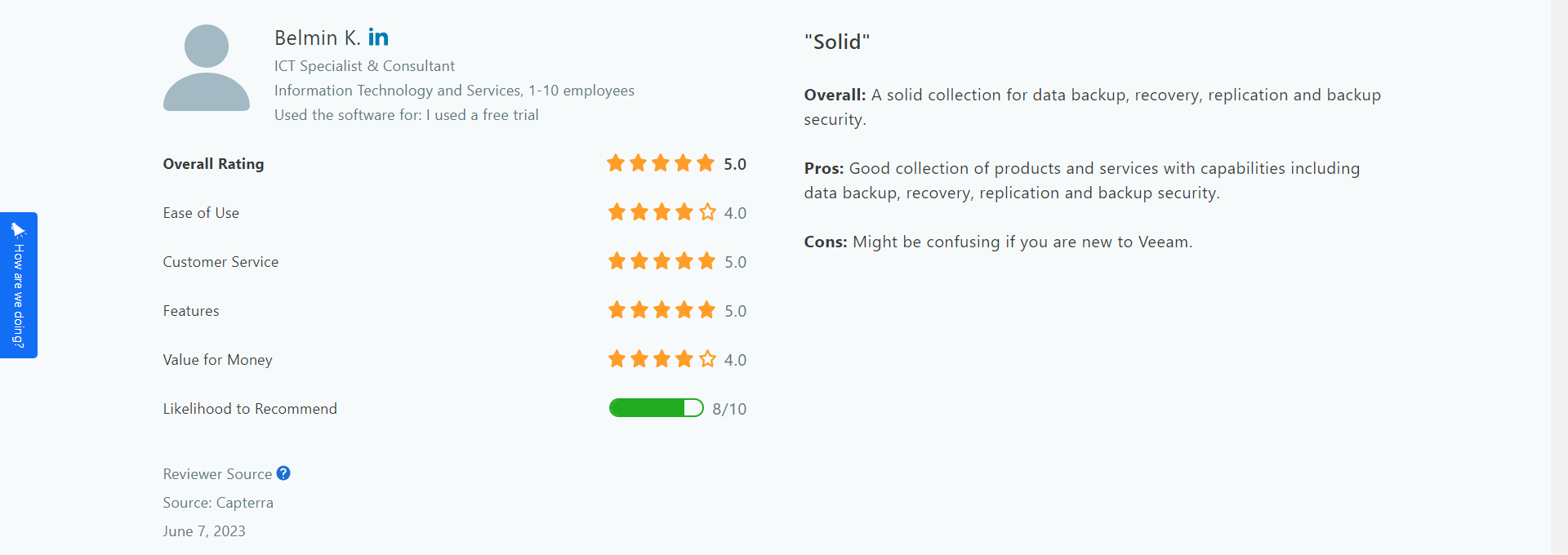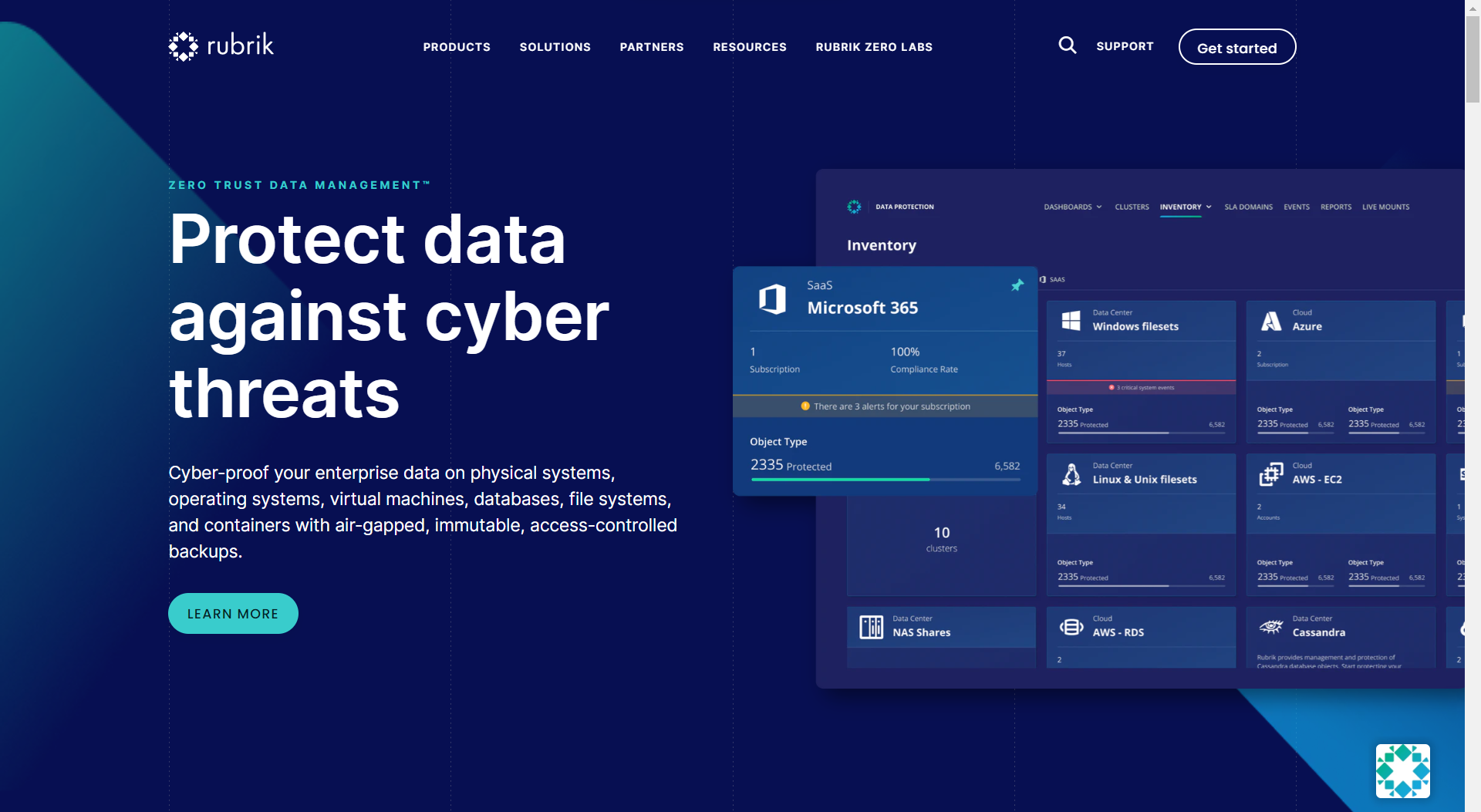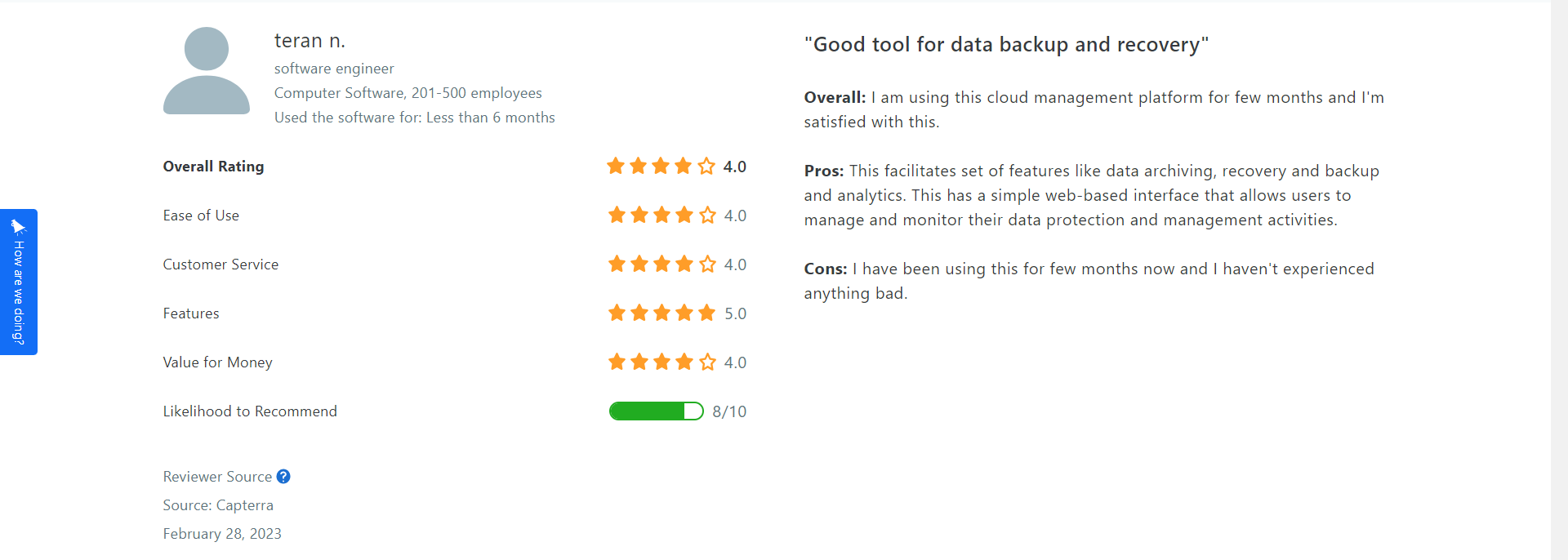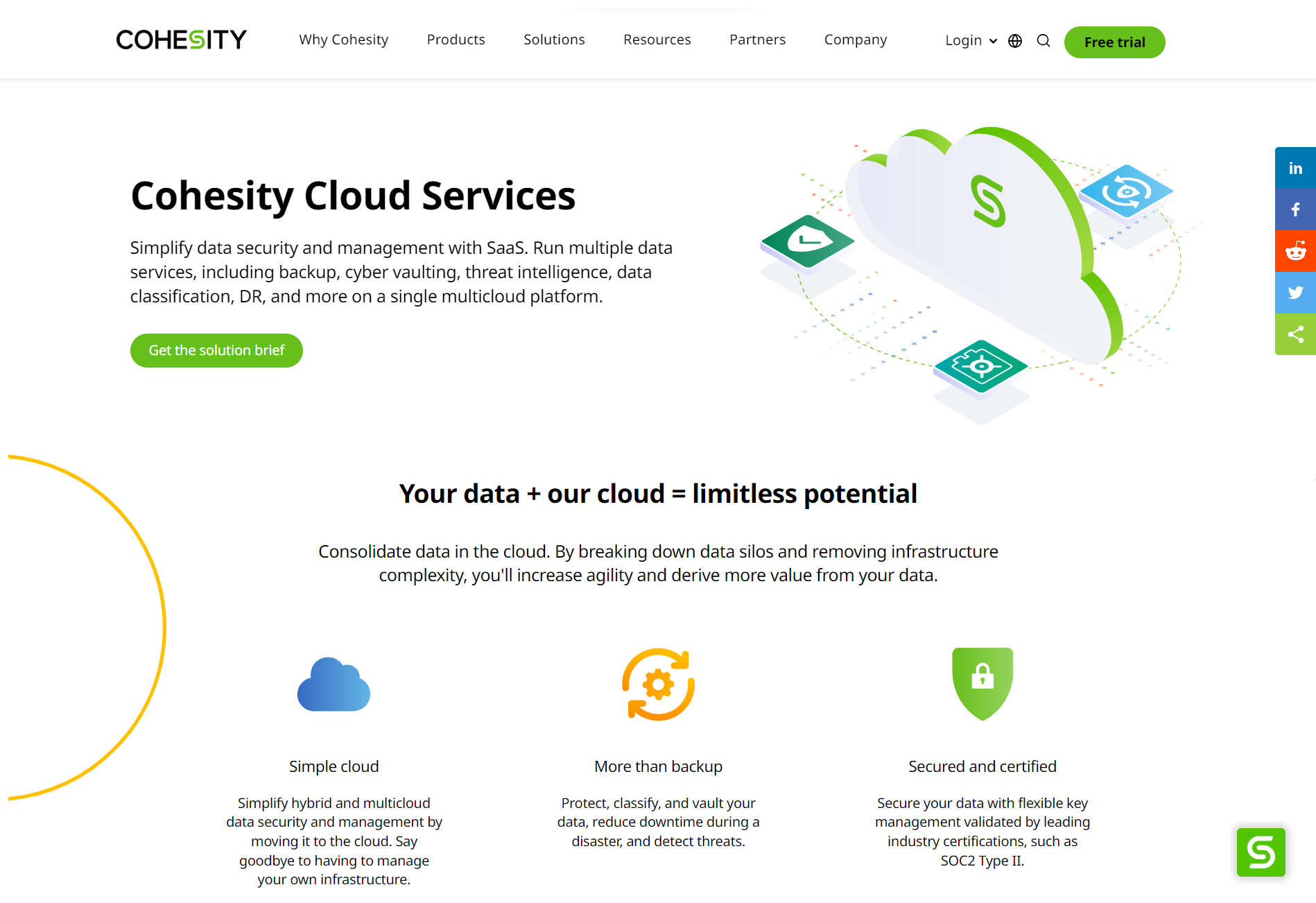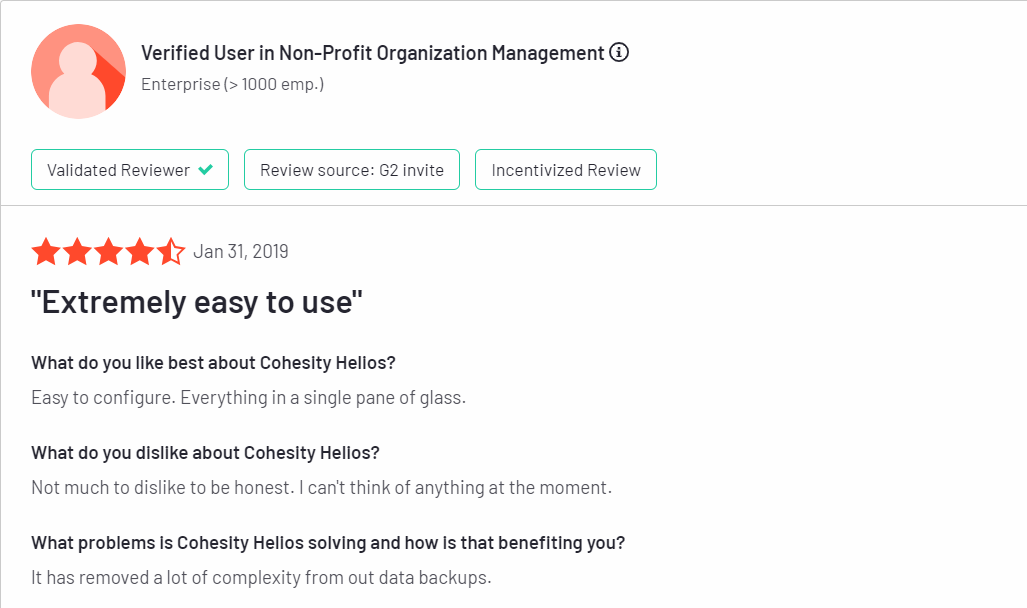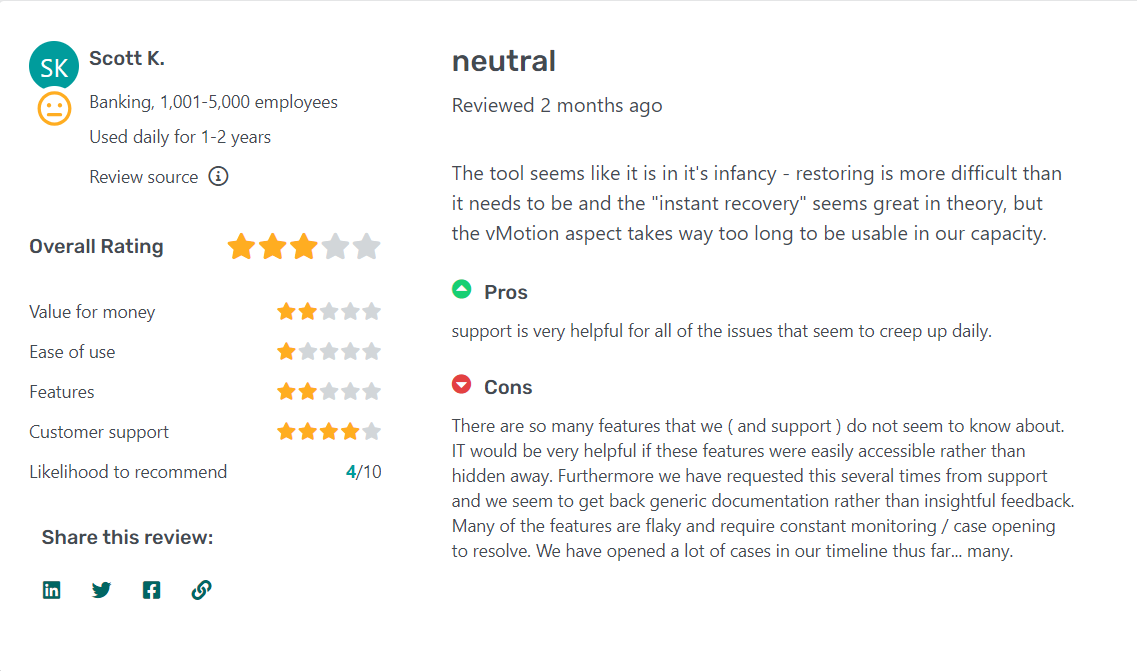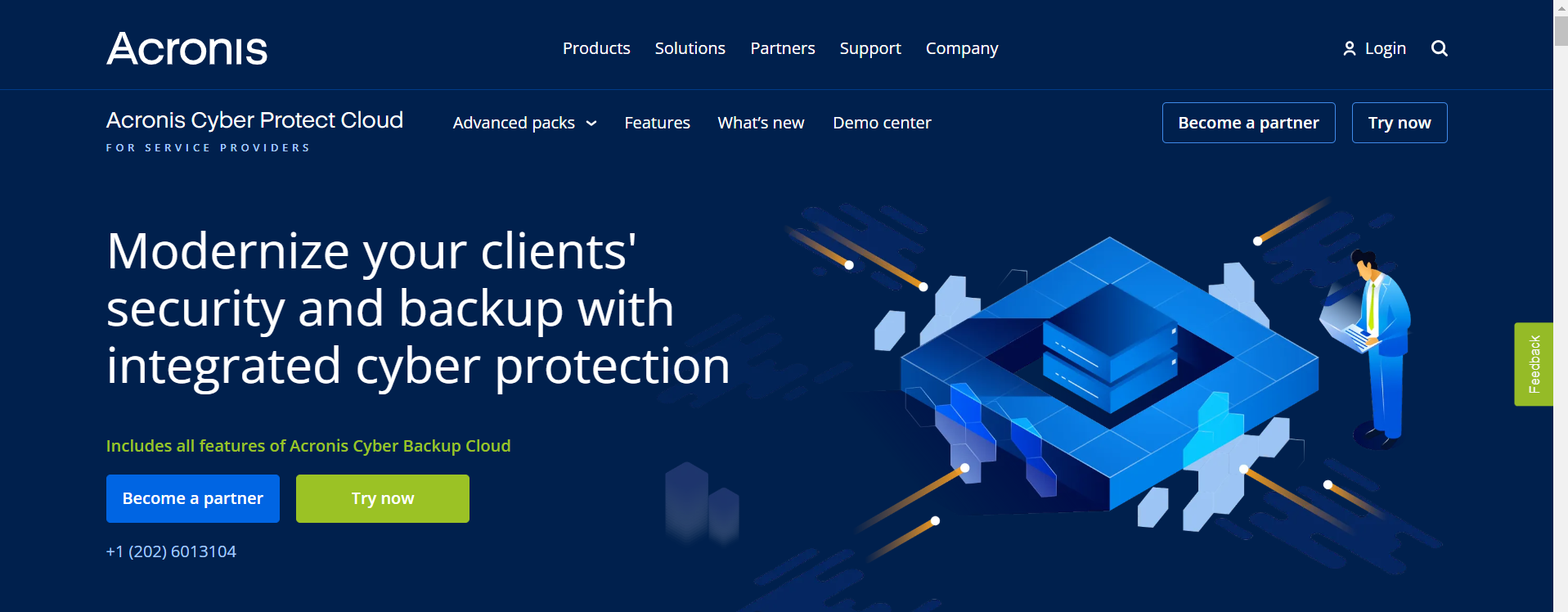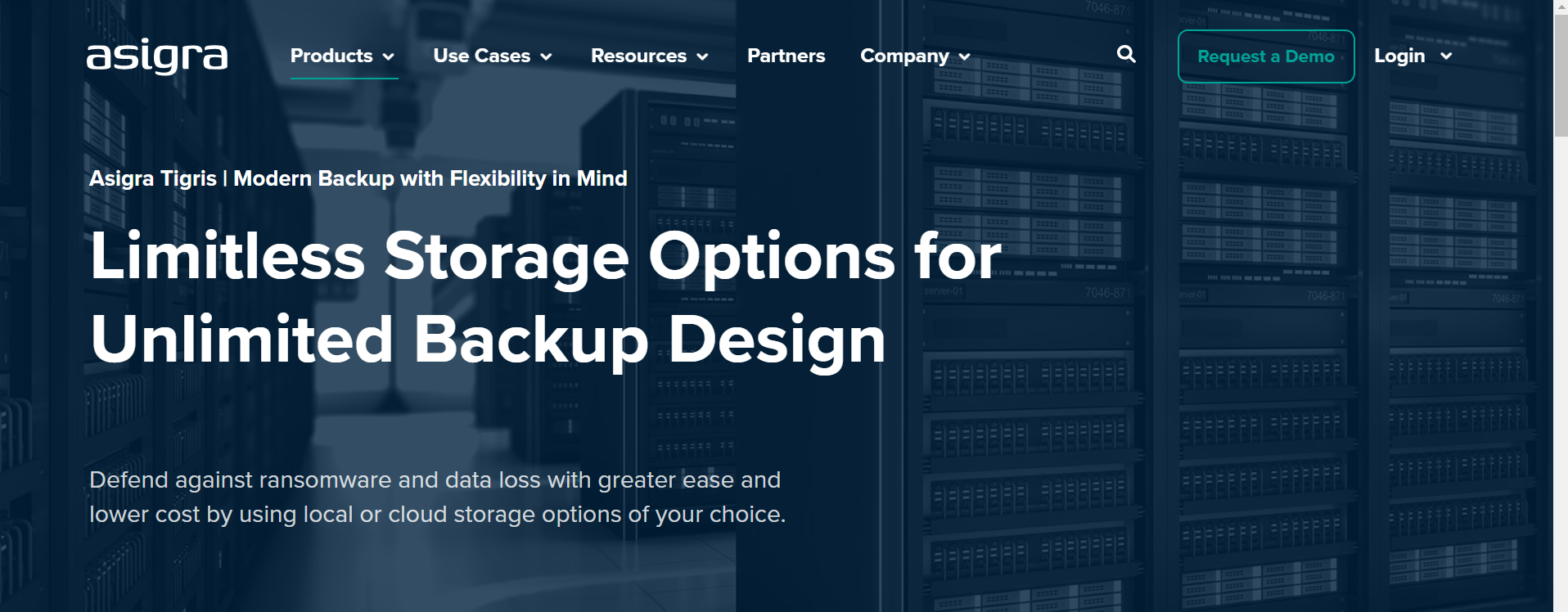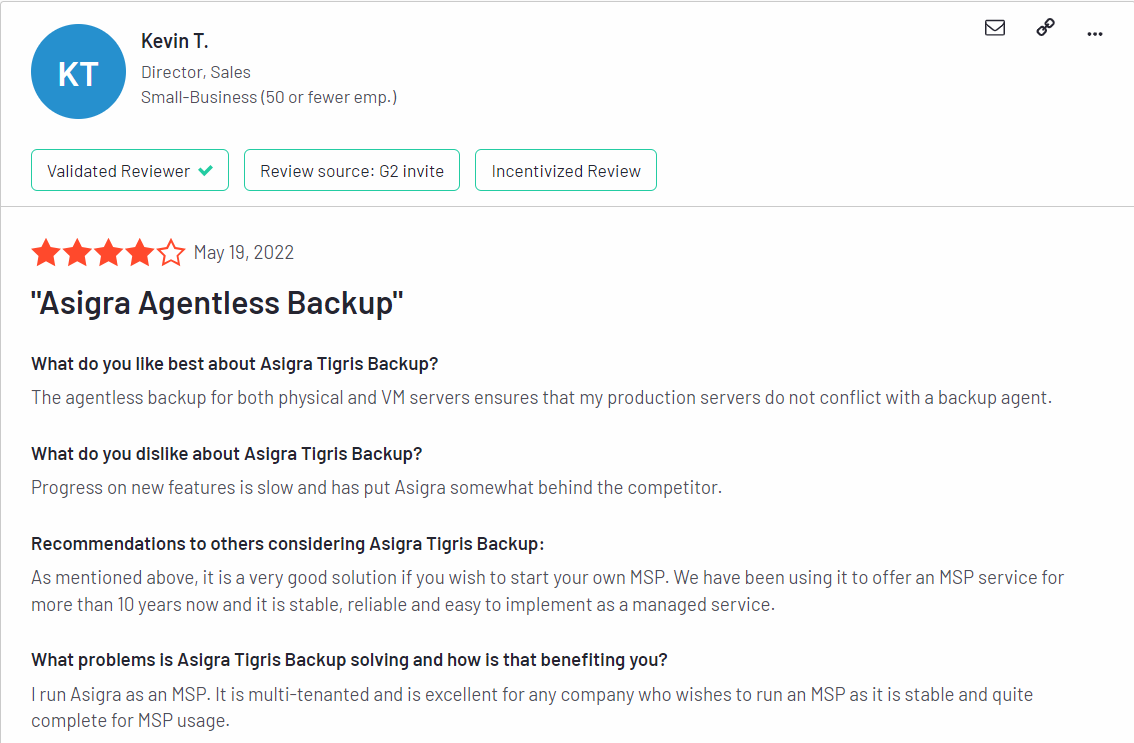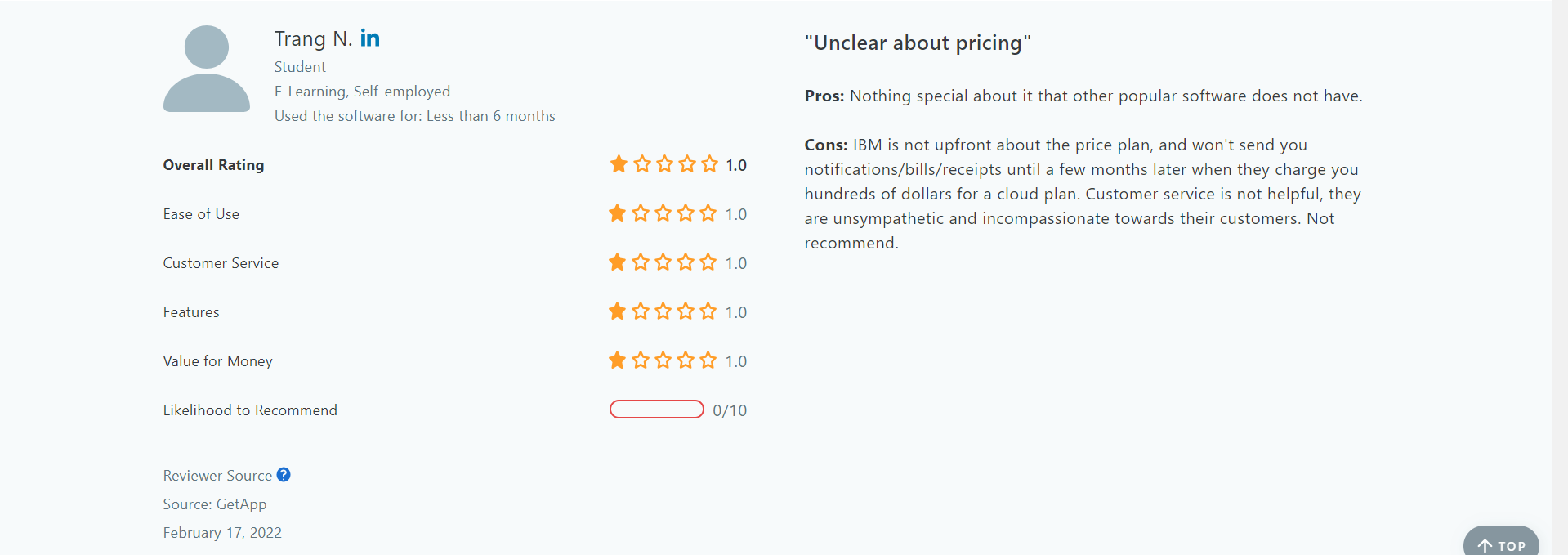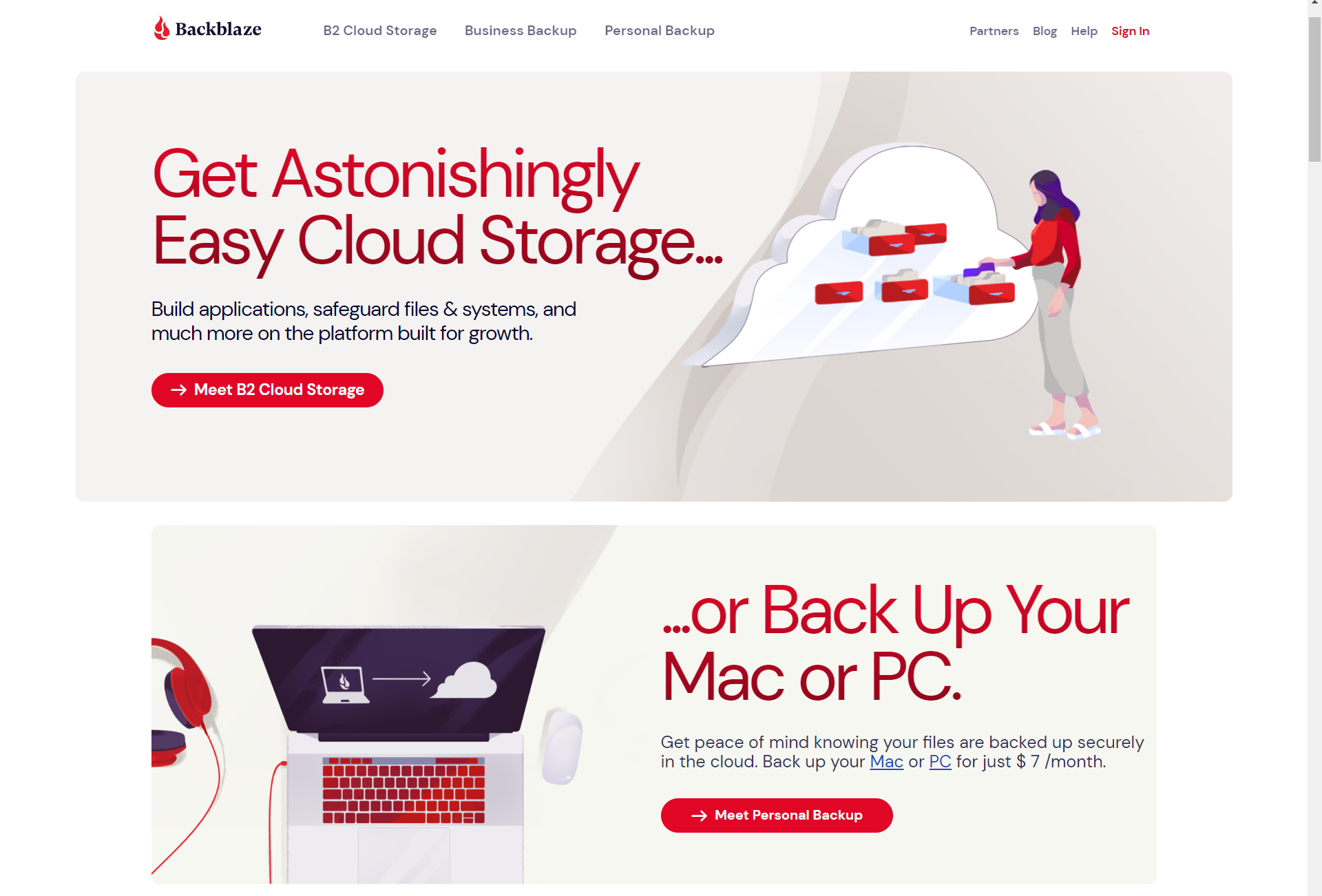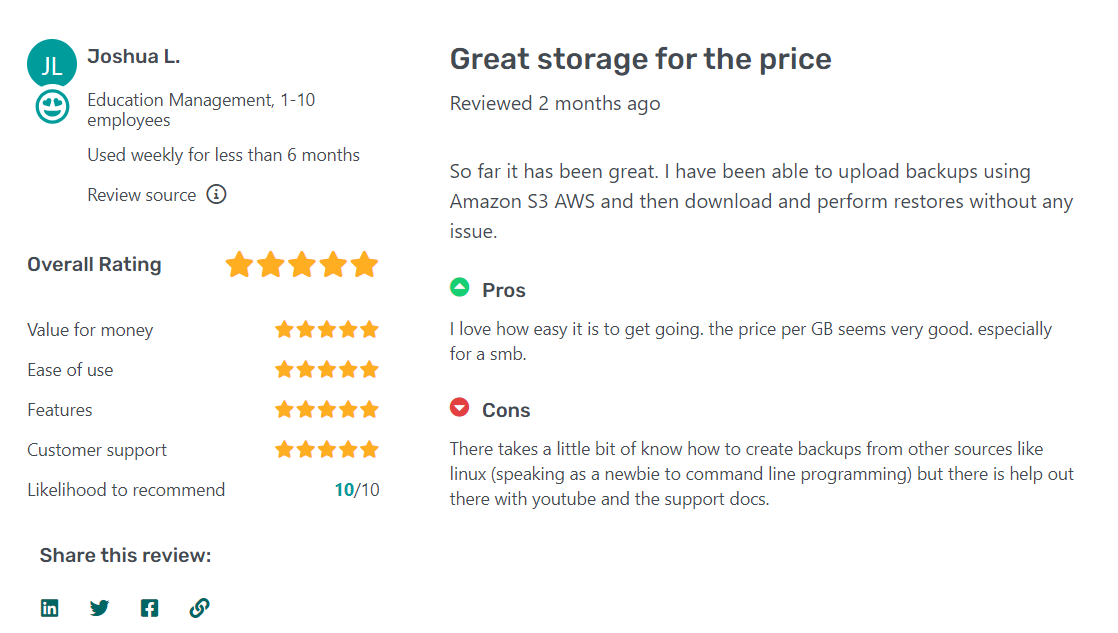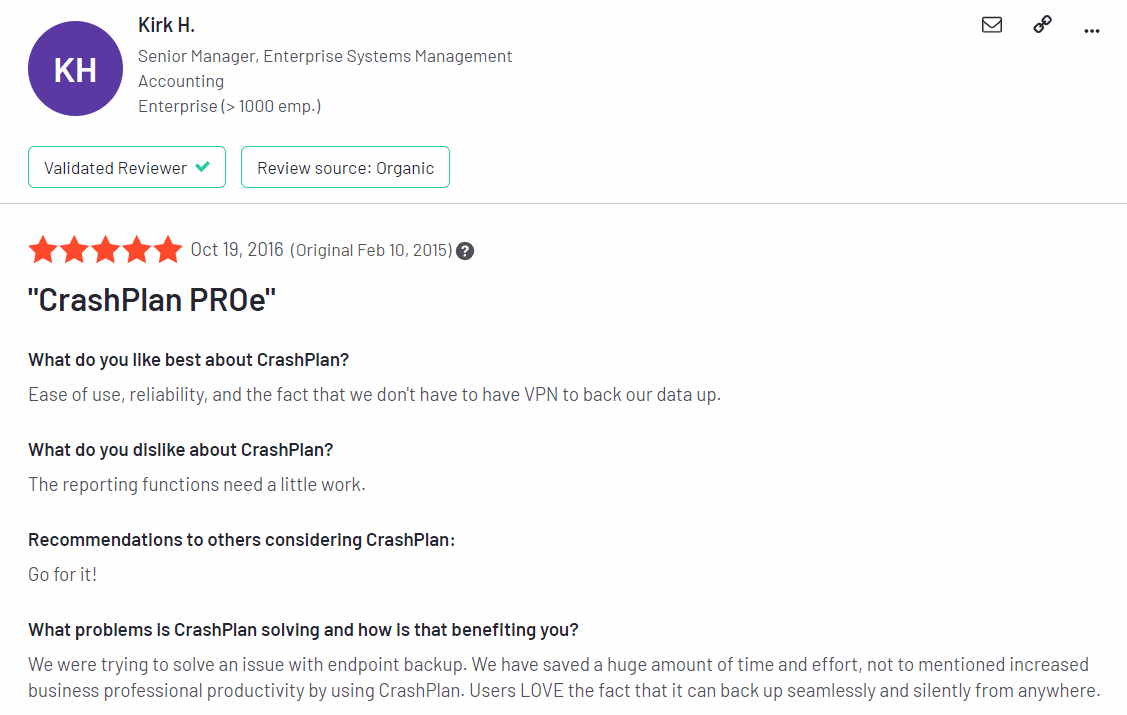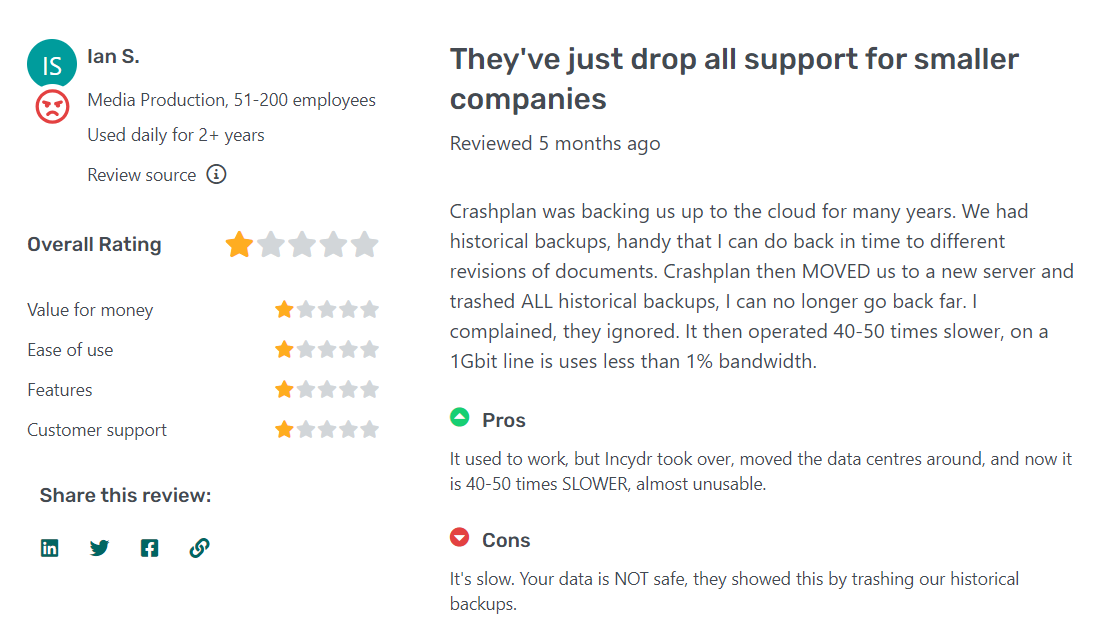Cloud backup solutions for large data have changed how companies handle their voluminous and ever-growing data pools.
With the proliferation of digital business operations, data protection, and retrieval have become paramount for enterprises, pushing the need for reliable and efficient backup solutions.
This comprehensive guide will walk you through twelve innovative enterprise cloud backup solutions that can help manage and protect large-scale data, ensuring business continuity even during unexpected data loss.
1. ShareArchiver
Established in 2013, ShareArchiver provides businesses with an industry-leading enterprise cloud backup solution.
It offers a wide range of features to cater to large corporations’ diverse data management needs.
List of Features
- Comprehensive Data Security
- Optimized RPO
- Optimized RTO
- Instant Data Restoring
- Robust Encryption
- Single Platform Management
- Geo-Redundant Storage
- Hybrid Backup
- Advanced File Version History Retention
- User-Friendly Management Console
Top 3 Features
1. Optimized RPO
Recovery Point Objective (RPO) is a critical feature that determines the frequency of backups, affecting the potential data loss a business could suffer in a disaster.
ShareArchiver shines with its Optimized RPO feature, ensuring minimal data loss by allowing frequent backups.
This feature offers a significant advantage for businesses handling critical data, where even a slight data loss could lead to substantial operational disruptions.
2. Optimized RTO
Recovery Time Objective (RTO) is the time to restore data after a disaster.
A lower RTO equates to faster recovery, thereby reducing the downtime experienced by a business.
ShareArchiver’s Optimized RTO feature ensures swift data recovery, making it an excellent choice for businesses that prioritize quick restoration of operations post a data loss incident.
3. Instant Data Restoring
Instant Data Restoring is another standout feature of ShareArchiver.
It enables businesses to retrieve their lost data without any hassles quickly.
This feature minimizes downtime and reduces the potential financial losses that can occur due to prolonged operational interruptions.
Pros
- Superior data management with efficient RPO and RTO
- Instant data restoration capability
- Robust encryption for enhanced data security
- Single platform management for ease of use
- Supports a wide range of platforms
Cons
Users have reported no issues with the software. Any reported problems were solved immediately by the developers in upcoming releases.
Pricing
For pricing information, contact Sales department.
Supported Platforms
- Windows
- MacOS
- Linux
- Cloud Platforms (AWS, Google Cloud Platform, Azure)
Customer Support Options
- 24/7 live rep
- Help desk
- Chat
- Phone support
User Reviews
- GetApp: 4.7/5
- Capterra: 4.7/5
Testimonials
Final Verdict
ShareArchiver offers a comprehensive and efficient solution for businesses dealing with large-scale data.
It effectively combines optimal RPO and RTO with an instant data restoring feature to ensure business continuity during data loss events.
2. Carbonite
Carbonite Inc, established in 2005, has made significant strides in the cloud backup market with its secure and reliable cloud backup services.
It is designed to handle businesses’ complex data backup needs, irrespective of their size.
List of Features
- Access Controls
- Automatic Backup
- Backup Scheduling
- Encryption and Security
- Data Recovery
- Cloud Server Backup
- Endpoint Backup
- Hybrid Cloud Support
- Single Console Management
- Comprehensive Support and Customer Success
Top 3 Features
1. Access Controls
Maintaining strict access control is vital in ensuring the integrity and security of your data.
Carbonite’s Access Controls feature allows businesses to manage who can access their backup data, offering a critical layer of security to prevent unauthorized access and potential data breaches.
2. Automatic Backup
Carbonite Inc.’s Automatic Backup feature simplifies backup operations and ensures data consistency.
It automatically backs up files whenever changes are made, eliminating the need for manual backups and reducing the risk of human error.
3. Backup Scheduling
With Carbonite’s Backup Scheduling feature, businesses have complete control over when their data is backed up.
This feature offers flexibility and allows backup operations to be scheduled during off-peak hours, minimizing disruption to business operations.
Pros
- Easy to use
- Efficient data security protocols
- Outstanding custom rsupport
- Advanced access control for enhanced data security
- Automatic backup for continual data protection
- Backup scheduling for flexibility and convenience
Cons
- Problems with backup file indication
- It could be more user-friendly
- The initial backup can be time-consuming
Pricing
Reach out to a solutions consultants of Carbonite for more information on price plans of different packages.
Supported Platforms
- Windows
- MacOS
- Linux
- iOS
- Android
- Cloud Platforms (AWS, Google Cloud Platform, Azure)
Integrations
- Bitium
- AdvancePro
Customer Support Options
- Help desk
- FAQs
- Forums
- Knowledge base
- Phone support
User Reviews
- GetApp: 4.3/5
- G2: 4.4/5
- Capterra: 4.3/5
Testimonials
Final Verdict
Carbonite Inc delivers flexible and secure enterprise cloud backup services.
Its Automatic Backup and Backup Scheduling features make data protection convenient, while Access Controls ensure enhanced security.
3. Veeam
Veeam provides an effective solution for businesses to secure, manage, and recover critical data.
Founded in 2006, Veeam offers cloud backup and disaster recovery solutions that cater to modern business needs.
Its software is designed to minimize downtime and ensure business continuity.
List of Features
- Cloud Backup
- Data Recovery
- Disaster Recovery
- Hybrid Cloud Support
- Encryption and Security
- Risk Reduction
- Cloud Server Backup
- Automatic Backup
- Backup Scheduling
- Policy Managment
Top 3 Features
1. Comprehensive Data Security
Veeam offers an all-encompassing data security solution to protect against data breaches, human error, and natural disasters.
It utilizes advanced encryption methods, making it a reliable choice for businesses looking to secure their sensitive data.
2. Hybrid Cloud Support
Veeam’s Hybrid Cloud Support ensures seamless data management across various platforms, including public clouds, private clouds, and on-premises servers.
This feature allows for flexibility and simplifies data backup and recovery processes.
3. Risk Reduction
Risk Reduction is a standout feature in Veeam’s suite of backup services.
It identifies potential risks and issues before they escalate, helping businesses prevent potential data loss incidents and enhance their data security posture.
Pros
- Affordable price plans
- Excellent replication capabilities
- Simple and intuitive interface
- Efficient backup system
Cons
- Limited customization options on the console
- Pricing could be more competitive
- Complicated troubleshooting
Pricing
Veeam offers Foundation, Advanced, and Premium packages. Each comes with a free demo and trial.
However, users can reach out to the Veeam sales department to know the prices for each plan.
Supported Platforms
- Windows
- MacOS
- Linux
- Cloud Platforms (AWS, Google Cloud Platform, Azure)
Integrations
- VMware Cloud Director Availability
- Qumulo File Data Platform
- ServicePilot
- VMware Cloud Director
- Emma
Customer Support Options
- Chat
- Help desk
- Phone support
- FAQs
- Forums
- Knowledge base
- 24/7 live rep
User Reviews
GetApp: 4.8/5
G2: 4.6/5
Capterra: 4.8/5
Testimonials
Final Verdict
Veeam’s comprehensive data security, hybrid cloud support, and proactive risk reduction make it a reliable choice for businesses seeking an effective and efficient cloud backup solution.
4. Rubrik
Providing a modern take on data management and backup, Rubrik is well-equipped to handle the unique demands of large-scale enterprise data with its enhanced enterprise backup solutions.
Founded in 2014, Rubrik has swiftly risen through the ranks of enterprise cloud backup solution providers with its blend of innovation and efficiency.
Rubrik’s software is built to tackle complex data management challenges and ensure seamless business continuity.
List of Features
- Archiving & Retention
- Audit Management
- Automatic Backup
- Disaster Recovery
- Encryption and Security
- Multi-cloud management
- Risk Management
- Secure Data Storage
- Vulnerability Protection
- Comprehensive Support and Customer Success
Top 3 Features
1. Archiving & Retention
With Rubrik’s Archiving & Retention feature, businesses can manage their data storage effectively, keeping what’s important while offloading outdated data.
The feature allows for customizable file retention policies, ensuring the right data is archived for the required duration, thus optimizing storage costs.
2. Audit Management
For businesses in regulated industries, Rubrik’s Audit Management is a boon.
It offers detailed audit trails and compliance reporting, allowing organizations to meet their regulatory obligations easily.
This feature provides a complete overview of all actions taken within the system, making audit preparation a seamless task.
3. Automatic Backup
Rubrik offers an Automatic Backup feature that significantly reduces the risk of data loss.
This function continuously backs up data, ensuring every change is instantly saved.
This removes the risk of losing valuable information between backup schedules, enhancing a business’s overall data protection framework.
Automated backups not only offer enhanced data security but also help in reducing the workload on IT teams.
Since the system takes care of data backups, IT personnel can focus on other critical tasks.
This feature also helps avoid human error, a common issue with manual backups.
Rubrik’s Automatic Backup function streamlines data protection processes, enhancing operational efficiency and data security.
Pros
- Modern data backup solutions
- Simple to use
- Robust archiving and retention capabilities
- Audit management for enhanced compliance
Cons
- There is no way to delete the backups of deleted files or data
- Lacks support for smaller database vendors
- The interface could be more intuitive
- Pricing can be a bit steep for smaller businesses
Pricing
Contact Rubrik for detailed pricing.
Supported Platforms
- Windows
- MacOS
- Linux
- Cloud Platforms (AWS, Google Cloud Platform, Azure)
Integrations
- VMware Cloud Director Availability
- Qumulo File Data Platform
- Google Cloud Storage
- VMware Cloud Director
- Emma
Customer Support Options
- Phone support
- 24/7 live rep
- Help desk
- Chat
User Reviews
GetApp: 4.7/5
G2: 4.6/5
Capterra: 4.7/5
Testimonials
Final Verdict
Rubrik offers a comprehensive solution for businesses dealing with large-scale data.
Its archiving & retention, and audit management capabilities, combined with automatic backup, make it a solid choice for any business needing robust data protection.
5. Cohesity
Simplifying data management with its cohesive suite of services, Cohesity stands as a robust and reliable cloud backup solution for businesses.
Cohesity, founded in 2013, provides a unified platform to simplify data management. With its comprehensive suite of features, Cohesity delivers seamless data backup and recovery services, ensuring business continuity.
List of Features
- Backup Scheduling
- Compression
- Business Impact Analysis
- Disaster Recovery
- Encryption and Security
- Cloud Server Backup
- Instant Recovery
- Data Deduplication
- Single Console Management
- Multilayered Ransomware Protection
Top 3 Features
1. Backup Scheduling
Cohesity’s Backup Scheduling feature enables businesses to set automated backup schedules according to their needs.
This feature allows companies to plan their backups strategically, ensuring minimal disruption to their operations.
Automating backups also reduces the risk of human error, further enhancing data protection.
In addition to operational efficiency, Backup Scheduling with Cohesity also provides businesses with the flexibility to handle unpredictable data loads.
This feature can handle periodic spikes in data generation, ensuring that all essential data is backed up effectively.
2. Compression
The Compression feature of cohesion aims to optimize storage space usage.
It reduces the size of the backed-up data, allowing more data to be stored within the given storage space.
This feature is particularly beneficial for companies handling large data volumes, as it helps save on storage costs.
Moreover, compression also speeds up the backup and recovery process.
Since the data size is reduced, it takes less time to back up and recover, leading to improved RTO.
Thus, Cohesity’s Compression feature optimizes storage usage and enhances data recovery speed.
3. Business Impact Analysis
Understanding the potential impact of a data loss event is vital for businesses to plan their disaster recovery strategies.
Cohesity’s Business Impact Analysis feature provides insights into the potential effects of data loss, helping businesses prioritize their recovery efforts.
This feature offers a comprehensive view of the business’s data infrastructure and the criticality of different data sets.
Businesses can better strategize their backup schedules and prioritize data recovery efforts during a disaster by knowing the potential impact of losing specific data sets
Pros
- Backup scheduling for efficient data protection
- Compression for optimal storage usage
- Business Impact Analysis for informed disaster recovery planning
- Excellent customer support
Cons
- The absence of user training makes the learning curve steep for beginners
Pricing
Contact Cohesity for detailed pricing.
Supported Platforms
- Windows
- MacOS
- Linux
- Cloud Platforms (AWS, Google Cloud Platform, Azure)
Integrations
- VMware Cloud Director
Customer Support Options
- Chat
- 24/7 live rep
User Reviews
GetApp: 4.6/5
G2: 4.4/5
Capterra: 4.6/5
Testimonials
Final Verdict
Cohesity presents a powerful solution for large-scale data management with innovative features like Backup Scheduling, Compression, and Business Impact Analysis.
It’s an excellent choice for businesses seeking a versatile and efficient cloud backup solution.
6. Acronis
Acronis has made a name in the cloud backup landscape with its robust and feature-rich solutions.
Established in 2003, Acronis has served businesses with reliable and efficient backup solutions.
The software caters to small businesses and large enterprises, offering advanced features to protect and manage data.
List of Features
- Automatic Scans
- Backup and Recovery
- Endpoint Management
- Endpoint Protection
- IT Risk Management
- Maintenance Scheduling
- Monitoring
- Risk Assessment
- Secure Data Storage
- Security Tools
Top 3 Features
1. Backup and Recovery
Backup and recovery are the heart and soul of any data protection solution, and Acronis Cyber Protect shines in this domain.
The software provides full system imaging, allowing for an entire system to be restored in the event of catastrophic failure, whether from hardware issues or a major cyber incident.
It provides flexible recovery options, such as bare-metal recovery or individual file and folder recovery, meaning that users can choose to restore an entire system or just specific files.
This is beneficial in scenarios where a full system recovery may not be necessary, and only a particular set of data is needed.
2. Endpoint Protection
Endpoint protection is another core feature of Acronis Cyber Protect.
It delivers comprehensive protection to all endpoints in an IT environment, including desktops, laptops, and mobile devices.
This robust defense system not only protects against common threats such as viruses and malware but also counters advanced threats like ransomware and zero-day attacks.
Beyond just prevention, Acronis Cyber Protect also includes a comprehensive detection and response capability.
It can identify indicators of compromise and automatically take the necessary actions to contain and remediate threats.
3. IT Risk Management
In today’s digital world, managing IT risks effectively is crucial for any organization.
Acronis Cyber Protect comes equipped with a set of IT risk management tools that allow for proactive identification, evaluation, and mitigation of potential threats to an organization’s IT infrastructure.
These tools include vulnerability assessments, patch management, and hard drive health monitoring.
Vulnerability assessments enable organizations to discover potential security holes within their systems before they can be exploited by cybercriminals.
Acronis Cyber Protect automates this process, scanning systems on a regular basis, and identifying where patches or updates are needed.
Pros
- Easy to configure
- Offers reliable offsite backup
- Proactive endpoint protection
- Backup scheduling for automated data protection
Cons
- The user interface could be more intuitive
- Customer support response times could be faster
Pricing
Contact Acronis sales department for detailed pricing
Supported Platforms
- Windows
- MacOS
- Linux
- Android
- iOS
- Cloud Platforms (AWS, Google Cloud Platform, Azure)
Integrations
- Microsoft 365
- Zoom Meetings
- Microsoft Teams
- Webex
- ConnectWise ScreenConnect
- Microsoft Azure
- Jamf Pro
Customer Support Options
- Help Desk
- Phone Support
- FAQs
- Forum
- Chat
- Knowledge Base
User Reviews
- GetApp: 4.1/5
- G2: 4.7/5
- Capterra: 4.1/5
Testimonials
Final Verdict
Acronis offers a comprehensive data protection solution with features like Backup Scheduling, Compression, and Backup Log.
Its ability to cater to businesses of all sizes makes it a versatile choice in the market of cloud backup solutions.
7. Dell EMC
Dell EMC‘s suite of backup solutions offers high-performance and reliable data protection for businesses handling large-scale data.
As a part of the tech giant Dell Technologies, Dell EMC offers robust backup solutions designed to cater to diverse business needs.
Dell EMC has quickly established itself as a reliable provider of enterprise cloud backup solutions.
List of Features
- Automatic Backup
- Backup and Recovery
- Cloud Backup
- Compression
- Continuous Backup
- Data Storage Management
- Disaster Recovery
- Encryption
- Continuous Backup
- Disaster Recovery
Top 3 Features
1. Continuous Backup
Data is constantly being created and updated in today’s fast-paced business environments.
Dell EMC’s Continuous Backup feature ensures all this data is protected in real-time.
This feature eliminates the risk of losing data between backup schedules by constantly backing up data.
Continuous backup reduces the Recovery Point Objective (RPO), as the most recent data is always backed up.
This ensures that businesses can recover the maximum amount of data in case of a data loss, minimizing the potential impact on operations.
2. Disaster Recovery
Data disasters can occur in many forms – from cyber attacks to hardware failures.
Dell EMC’s Disaster Recovery feature ensures businesses can quickly recover their data and resume operations after such incidents.
This feature helps restore lost data and provides functionalities like failover and failback to ensure seamless business continuity.
With Dell EMC’s Disaster Recovery, businesses can maintain resilience in unexpected data loss incidents.
3. Compression
Like many leading backup solution providers, Dell EMC offers a Compression feature to optimize storage usage.
This feature reduces the size of backup data, allowing businesses to store more data in their allocated storage space.
The Compression feature also accelerates backup and recovery operations, as smaller data sizes can be transferred faster.
This enables businesses to achieve quicker recoveries and minimize downtime during data loss.
Pros
- Continuous backup for real-time data protection
- Comprehensive disaster recovery for business resilience
- Compression for optimized storage usage
Cons
- The user interface could be more intuitive
- Pricing could be more competitive
Pricing
Contact Dell EMC for detailed pricing.
Supported Platforms
- Windows
- MacOS
- Linux
- Cloud Platforms (AWS, Google Cloud Platform, Azure)
Integrations
- VMware Cloud Disaster Recovery
- StorageGuard
Customer Support Options
- Phone Support
- Knowledge Base
- Chat
User Reviews
- GetApp: 4.2/5
- Capterra: 4.2/5
Testimonials
Final Verdict
Dell EMC provides a robust and reliable backup solution with continuous backup, disaster recovery, and compression features.
It’s a strong contender for businesses seeking a comprehensive and efficient enterprise cloud backup solution.
8. Asigra
Asigra offers a comprehensive cloud backup solution built to secure large-scale data across various platforms effectively.
Established in 1986, Asigra brings a wealth of experience in providing secure and reliable backup solutions.
The company’s Cloud Backup solution is an enterprise-class data protection product with robust backup and recovery features.
List of Features
- Backup Log
- Backup Scheduling
- Cloud Backup
- Compression
- Continuous Backup
- Encryption
- Incremental Backup
- Local Server Options
- Remote Server Options
- Secure Data Storage
Top 3 Features
1. Continuous Backup
Asigra’s Continuous Backup feature ensures that all data changes are instantly backed up, providing real-time data protection.
By constantly updating backup files, businesses can always maintain a current and complete version of their data.
This feature significantly reduces the Recovery Point Objective (RPO), meaning the amount of data at risk of being lost in the event of a disaster is minimal.
Continuous backup is an invaluable feature in fast-paced business environments where data is constantly being created and updated.
2. Cloud Backup
With increasing numbers of businesses moving their operations to the cloud, the need for reliable cloud backup solutions has grown.
Asigra’s Cloud Backup feature offers secure and efficient backup of data stored on cloud servers.
This feature supports various cloud platforms, including AWS, Google Cloud Platform, and Azure.
By providing an efficient backup solution for cloud-stored data, Asigra ensures businesses can effectively protect their data, regardless of where it’s stored.
3. Backup Scheduling
Asigra’s Backup Scheduling feature allows businesses to set their own backup schedules according to their unique operational needs.
Whether hourly, daily, or weekly backups, businesses can automate their backup processes to occur at the most convenient times.
Asigra enables businesses to balance operational efficiency and data protection needs by providing the capability to schedule backups.
Regularly scheduled backups ensure businesses can recover the maximum data after a data loss event.
Pros
- Feature-rich layout
- Seamless backup processes
- Continuous backup for real-time data protection
- Flexible backup scheduling for operational convenience
Cons
- Problems with support options
- It may be challenging for beginners
- The interface could be more user-friendly
Pricing
Contact Asigra for detailed pricing.
Supported Platforms
- Windows
- MacOS
- Linux
- Cloud Platforms (AWS, Google Cloud Platform, Azure)
Customer Support Options
- 24/7 (Live rep)
- Chat
User Reviews
- G2: 4.2/5
Testimonials
Final Verdict
Asigra offers a robust and efficient cloud backup solution for businesses, with key features such as Continuous Backup, Cloud Backup, and Backup Scheduling.
Its emphasis on security and flexibility makes it a powerful option for businesses seeking reliable backup solutions.
9. IBM Cloud
IBM Cloud offers full backup services to help businesses protect and manage their critical data effectively.
As part of the global technology giant IBM, IBM Cloud provides many cloud services, including a powerful cloud backup solution.
IBM Cloud’s backup services deliver robust and secure features to manage large-scale data effectively.
List of Features
- Activity Dashboard
- Activity Tracking
- Activity Management
- Disaster Recovery
- Cloud Server Backup
- Hybrid Cloud Support
- Scalable Infrastructure
- Secure Data Transfer
- Data Lifecycle Management
- Advanced Encryption
Top 3 Features
1. Activity Dashboard
IBM Cloud’s Activity Dashboard provides a centralized platform where all backup activities can be monitored in real-time.
This feature lets businesses gain complete visibility into their backup operations and make informed decisions based on current data.
The Activity Dashboard provides information on the status of backup jobs, the amount of data backed up, and any issues or errors.
With this feature, businesses can ensure that their backup operations run smoothly and effectively.
2. Activity Tracking
Complementing the Activity Dashboard, IBM Cloud’s Activity Tracking feature allows businesses to keep track of all actions related to their backup operations.
Whether initiating a backup job, restoring data, or changing backup settings, all activities are recorded and can be reviewed when needed.
Activity Tracking is especially useful for audit purposes, providing a detailed record of all backup operations.
It also aids in identifying any issues or irregularities, enabling businesses to take corrective action quickly.
3. Activity Management
The Activity Management feature of IBM Cloud gives businesses control over their backup processes.
Businesses can manage their backup schedules, control data transfer rates, and decide which data sets to back up.
By giving businesses control over their backup activities, IBM Cloud enables them to tailor their backup operations to fit their specific needs and preferences.
This not only enhances data protection but also ensures efficient use of resources.
Pros
- Activity Dashboard for real-time monitoring of backup operations
- Activity Tracking for detailed records of backup activities
- Activity Management for customizable backup operations
Cons
- The interface may be complex for beginners
- Customer service could be improved
Pricing
Contact IBM for detailed pricing.
Supported Platforms
- Windows
- MacOS
- Linux
- Cloud Platforms (AWS, Google Cloud Platform, Azure)
Customer Support Options
- Help desk
User Reviews
- GetApp: 4.5/5
- G2: 4.5/5
- Capterra: 4.5/5
Testimonials
Final Verdict
IBM Cloud provides a robust and comprehensive solution for cloud backup.
Features like Activity Dashboard, Activity Tracking, and Activity Management provide businesses with visibility, control, and customization, making it a reliable option in the enterprise backup market.
10. Unitrends Backup
Unitrends Backup combines simplicity and efficiency to deliver a reliable and comprehensive cloud backup solution for businesses.
Unitrends Backup, founded in 1989, offers versatile data protection services to meet the unique needs of businesses.
Its scalable architecture and intuitive interface provide an efficient solution for managing and protecting large-scale data.
List of Features
- Activity Dashboard
- Activity Notifications
- Archiving & Retention
- Hybrid Cloud Support
- Disaster Recovery
- Instant Recovery
- Automated Testing
- Deduplication
- Ransomware Protection
- Direct-to-Cloud Backup
Top 3 Features
1. Activity Dashboard
Unitrends’ Activity Dashboard provides a centralized view of all backup activities.
It offers real-time updates and detailed insights into ongoing and completed backup jobs.
This allows businesses to monitor their backup operations effectively and make informed decisions.
The dashboard also provides alerts for any issues or anomalies in the backup process.
This enables businesses to promptly address any problems and maintain the efficiency and effectiveness of their backup operations.
2. Activity Notifications
Staying informed about the status of backup operations is crucial for effective data management.
Unitrends’ Activity Notifications feature ensures that businesses are always updated about their backup status.
It sends out notifications for completed backups, errors, and any important events related to the backup operations.
These timely notifications allow businesses to stay on top of their backup operations, quickly address issues, and ensure their data is always protected.
3. Archiving & Retention
For businesses dealing with vast data, efficient data storage becomes a priority. Unitrends’ Archiving & Retention feature helps businesses manage their storage space efficiently.
It allows businesses to set retention policies for their data, ensuring that old data is archived and necessary data is retained.
Businesses can optimize their storage resources and reduce associated costs by efficiently managing data storage.
Plus, with data appropriately archived and retained, businesses can ensure quick and efficient data recovery when needed.
Pros
- User friendly and easy to navigate
- Affordable price plans
- Efficient support option
Cons
- Prompts random errors at times
- Troubleshooting problems
Pricing
Contact sales department for detailed pricing options.
Supported Platforms
- Windows
- MacOS
- Linux
- Cloud Platforms (AWS, Google Cloud Platform, Azure)
Integrations
- Microsoft 365
- Microsoft SharePoint
- Google Cloud
- Microsoft Azure
- Compliance Manager GRC
Customer Support Options
- FAQs
- Forum
- Phone Support
- Help Desk
- Knowledge Base
- Chat
- 24/7 (Live rep)
User Reviews
- GetApp: 4.7/5
- G2: 4.3/5
- Capterra: 4.7/5
Testimonials
Final Verdict
Unitrends Backup is a dependable business choice, offering robust features like Activity Dashboard, Activity Notifications, and Archiving & Retention.
Its focus on simplicity and efficiency makes it a great fit for businesses seeking a reliable cloud backup solution.
11. Backblaze
Backblaze provides a streamlined, cost-effective solution for businesses seeking reliable and secure cloud backup.
Founded in 2007, Backblaze has made its mark with its straightforward and affordable cloud backup services.
Its platform is designed to be easy to use while providing comprehensive data protection features.
List of Features
- Automatic Backup
- Backup Scheduling
- Backup and Recovery
- Cloud Backup
- Continuous Backup
- Data Migration
- Data Recovery
- Data Storage Management
- Differential Backup
- Disaster Recovery
Top 3 Features
1. Activity Dashboard
The Activity Dashboard in Backblaze provides a real-time view of backup operations.
This includes the status of current backups, previous backups, and any issues that may have occurred.
Businesses can ensure their backup operations run smoothly and effectively by providing a comprehensive view of backup activities.
This feature also lets administrators spot and resolve any issues quickly, minimizing potential impacts on data protection.
The dashboard’s intuitive design makes it easy for businesses to manage and monitor their backup operations.
2. Automatic Backup
Automatic Backup is a key feature of Backblaze.
It ensures that all data is backed up without requiring manual intervention, reducing the possibility of human error and missed backups.
This feature operates in the background, causing minimal disruption to regular operations.
With Automatic Backup, businesses can rest easy knowing their data is constantly protected.
This feature also reduces the workload on IT teams, freeing them to focus on other essential tasks.
3. Backup Scheduling
Backblaze’s Backup Scheduling feature allows businesses to set backup timings according to operational requirements.
This ensures backups are conducted conveniently, minimizing any impact on network performance and business operations.
Businesses can schedule backups during non-peak hours or at intervals that best match their data generation rates.
This flexibility ensures that backups are efficient and effective, providing optimal data protection for businesses.
Pros
- Robust backup solutions
- Real-time monitoring with Activity Dashboard
- Automatic Backup for constant data protection
- Flexible Backup Scheduling for operational efficiency
Cons
- Limited support for mobile devices
- It does not support hybrid backups
Pricing
Contact Backblazer for a tailored price plan.
Supported Platforms
- Windows
- MacOS
- Android
- iOS
- Cloud Platforms (AWS, Google Cloud Platform, Azure)
Integrations
- Meta for Business
- Cloudflare
- MSP360 Managed Backup
- GoodSync
- Comet Backup
Customer Support Options
- 24/7 (Live rep)
- Chat
- Knowledge Base
- Help Desk
- FAQs
- Forum
User Reviews
- GetApp: 4.7/5
- G2: 4.6/5
- Capterra: 4.7/5
Testimonials
Final Verdict
Backblaze offers a streamlined and cost-effective solution for businesses needing reliable cloud backup.
Its features, like the Activity Dashboard, Automatic Backup, and Backup Scheduling, make it an efficient and user-friendly choice for businesses of all sizes.
12. CrashPlan
CrashPlan is designed for businesses seeking a straightforward, reliable cloud backup solution with strong security features. Crashplan, created by Code42 and launched in 2007, offers businesses an effective solution for data protection.
The software is known for its user-friendly interface, secure backup capabilities, and robust features.
List of Features
- Application Security
- Activity Tracking
- Backup Log
- Encryption
- Real-time Reporting
- Data Restoration
- Continuous Backups
- Threat Response
- Compliance Management
- Remote File Access
Top 3 Features
1. Application Security
CrashPlan places a high priority on security, and it shows in its Application Security feature.
This feature includes multiple security measures, such as secure user access controls, role-based permissions, and secure application development practices.
Application Security ensures only authorized users can access and manage the backup processes.
Additionally, by using secure coding practices, Crashplan minimizes vulnerabilities in the application itself, providing an extra layer of protection to the backup data.
2. Activity Tracking
For businesses that need to maintain tight control over their backup operations, Crashplan’s Activity Tracking feature is invaluable.
This feature records all activities related to the backup processes, including data changes, backup schedules, and user actions.
Activity Tracking not only helps in monitoring the backup operations but also assists in identifying any anomalies or issues. Moreover, it serves as a reliable source of audit logs, aiding businesses in demonstrating compliance with data protection regulations.
3. Backup Log
Crashplan’s Backup Log feature gives businesses a detailed record of all backup operations.
This includes information on when backups were performed, how much data was backed up, and whether there were any issues during the process.
A detailed backup log can assist businesses in identifying any trends or patterns in their backup operations, allowing them to optimize these processes over time.
Furthermore, in the event of any issues or data loss incidents, the backup log can provide valuable insights to aid recovery and remediation efforts.
Pros
- Strong application security for data protection
- Activity tracking for comprehensive monitoring and control
- Detailed backup logs for transparency and audit purposes
Cons
- The user interface could be more intuitive.
- Limited options for customer support
Pricing
CrashPlan for Small Business: $10 per month per device
For enterprise price plans, reach out to CrashPlan sales for a quote.
Supported Platforms
- Windows
- MacOS
- Linux
- Cloud Platforms (AWS, Google Cloud Platform, Azure)
Integrations
- ITBoost
Customer Support Options
- Knowledge Base
- Chat
- Email/Help Desk
- FAQs/Forum
- Phone Support
User Reviews
- GetApp: 4.5/5
- G2: 4.4/5
- Capterra: 4.5/5
Testimonials
Final Verdict
Crashplan offers a comprehensive and secure cloud backup solution with features like Application Security, Activity Tracking, and Backup logs.
Its emphasis on security and control makes it a reliable choice for businesses needing robust data protection.
Table Comparison
| Optimized RTO and RPO | Instant Data Restoring | Access Control | Automatic Backup | 256-bit Encryption | Data Security | Archiving and Retention | |
| ShareArchiver | ✅ | ✅ | ✅ | ✅ | ✅ | ✅ | ✅ |
| Carbonite | ❌ | ❌ | ✅ | ✅ | ✅ | ❌ | ✅ |
| Veeam | ❌ | ❌ | ✅ | ❌ | ✅ | ✅ | ❌ |
| Rubrik | ❌ | ❌ | ✅ | ✅ | ✅ | ✅ | ✅ |
| Cohesity | ❌ | ❌ | ✅ | ❌ | ✅ | ✅ | ✅ |
| Acronis | ❌ | ❌ | ✅ | ✅ | ✅ | ✅ | ✅ |
| Dell EMC | ❌ | ❌ | ✅ | ❌ | ✅ | ✅ | ✅ |
| Asigra | ❌ | ❌ | ✅ | ❌ | ✅ | ✅ | ✅ |
| IBM Cloud | ❌ | ❌ | ✅ | ❌ | ✅ | ✅ | ✅ |
| Unitrends Backup | ❌ | ❌ | ✅ | ✅ | ✅ | ❌ | ✅ |
| Backblaze | ❌ | ❌ | ✅ | ✅ | ✅ | ❌ | ✅ |
| CrashPlan | ❌ | ❌ | ✅ | ✅ | ✅ | ❌ | ✅ |
In this table, it’s clear that ShareArchiver stands out as the best software for enterprise cloud backup, as it’s the only software offering features like optimized RPO and RTO, instant data restoring, and artificial intelligence integration.
Best of the Best
Choosing the best from a list of special software is a tough task.
However, when considering the best enterprise cloud backup solutions for large-scale data, these three software stand out:
- ShareArchiver: With its optimized RPO, RTO, and instant data-restoring features, ShareArchiver takes the lead. It provides efficient backup services and ensures that your data is securely stored and easily recoverable.
- Dell EMC: Dell EMC is a close runner-up with its continuous backup, disaster recovery, and compression features. It provides comprehensive data protection solutions suitable for businesses of all sizes.
- IBM Cloud: IBM Cloud’s activity dashboard, activity tracking, and activity management features make it a strong contender. It provides businesses visibility, control, and customization, making it a reliable backup solution.
Conclusion
Enterprise cloud backup solutions are crucial to any organization’s data management strategy.
As businesses continue to generate large-scale data, the need for efficient, secure, and reliable backup solutions becomes increasingly important.
ShareArchiver, with its unique blend of features and capabilities, stands out as the best choice among all the options.
The efficiency, security, and reliability offered by ShareArchiver make it the ideal enterprise cloud backup solution for large-scale data.
We strongly recommend that businesses try ShareArchiver and experience its benefits firsthand.
Buyer’s Guide
As you navigate the enterprise cloud backup solution market, here are some common questions and their answers to guide your decision:
What is large data?
To properly delve into the subject of large data, we first need to understand what data is.
In the simplest terms, data refers to raw, unprocessed facts and statistics collected during the operations of a business.
It can range from basic information about customers, such as their names, ages, and buying habits, to more complex data, like patterns in customer behavior, sales trends, etc.
Large data, sometimes called ‘Big Data,’ goes beyond this.
Large data represents an extraordinary volume of data that is too large, too fast, or too varied to be processed by traditional data processing tools.
It can range from terabytes (1,000 gigabytes) to zettabytes (1,000,000,000,000 gigabytes) or even more.
The ‘bigness’ of large data comes not only from the sheer volume but also from its velocity (the speed at which data is generated and processed), variety (different types of data), and veracity (the accuracy of the data).
This data can come from myriad sources, including social media posts, IoT devices, online transactions, emails, videos, and more.
The key here is not just the size of the data but how businesses use it to gain insights, make informed decisions, and drive innovation.
Harnessing the power of large data can lead to more efficient operations, better customer experience, new products or services, and even entirely new business models.
What is enterprise cloud backup solutions?
As businesses increasingly utilize large data for their operations, ensuring the safety and availability of this data becomes paramount.
This is where enterprise cloud backup solutions come into play.
Enterprise cloud backup solutions are systems that protect data by storing and recovering it from an offsite, usually multi-tenant, cloud-based platform.
These solutions have fundamentally transformed the way organizations protect, store, and manage their data, offering a more reliable and efficient method compared to traditional onsite storage.
Cloud backup solutions work by creating copies of the data or applications on a business’s servers and storing that information remotely in the cloud.
This data can then be restored in the event of a loss, such as a system crash, cyber attack, or natural disaster.
These solutions often include features such as data deduplication, where duplicate copies of files are eliminated to save space, and encryption, where data is encoded for security purposes.
They also typically offer scalability, allowing businesses to easily adjust their storage needs in response to growth or changes in demand.
Why are enterprise cloud backup solutions necessary?
In an increasingly digital world, data has become a business’s most valuable asset. Protecting this asset is, therefore, a critical operational requirement.
Enterprise cloud backup solutions offer a comprehensive, secure, and scalable method of doing so, and here’s why they are so important:
Data Protection: Data loss can occur due to a variety of reasons, including hardware failures, human error, cyberattacks, and natural disasters.
Cloud backup solutions provide a robust and reliable data protection method, ensuring that businesses can quickly recover their data in the event of a loss.
Cost Efficiency: Traditional data storage and backup methods often involve the significant capital expenditure on hardware, software, and maintenance.
Cloud backup solutions, on the other hand, typically operate on a subscription model, turning this into a more predictable operational expense.
Furthermore, features like data deduplication can significantly reduce the amount of storage space required, leading to additional cost savings.
Scalability: As businesses grow, so too do their data storage needs.
Cloud backup solutions offer the ability to easily scale up (or down) storage capacity as required, without the need for significant capital expenditure or complex upgrades.
Accessibility: Stored data in the cloud can be accessed from anywhere with an internet connection, providing businesses with a great deal of flexibility and ensuring that data can be restored quickly in the event of a loss, minimizing downtime.
Compliance: Many industries are subject to regulations that require certain types of data to be stored for specific periods.
Cloud backup solutions often include features that help businesses meet these requirements, such as automated retention policies and audit trails.
What features should I look for in an enterprise cloud backup solution?
Finding the best enterprise cloud backup solution requires a keen eye for specific features that cater to the organization’s unique requirements.
Here are some vital features to look for while evaluating different options:
Scalability
As your business evolves, so will your data backup needs.
A good enterprise cloud backup solution should easily adapt to your changing requirements, whether that means increasing storage capacity, adjusting frequency of backups, or scaling other parameters.
Security and Encryption
Your backup solution should have robust security protocols, such as end-to-end encryption, to safeguard your data from potential breaches.
Look for solutions that utilize secure encryption both during data transfer and while data is at rest in the cloud.
Compliance
Depending on the industry, organizations might need to adhere to specific regulations about how and where data is stored.
Ensure the solution you choose helps your organization meet its legal and regulatory compliance needs.
Data Recovery Capabilities
The ultimate purpose of a backup solution is to enable data recovery.
Look for a solution that offers quick, reliable, and easy recovery of data in various scenarios, from minor accidental deletions to major system failures.
Data Deduplication
This feature eliminates redundant copies of data, thereby saving storage space and reducing costs.
Versioning
A good backup solution should keep multiple versions of your data, allowing you to roll back to a specific point in time, if necessary.
Ease of Use and Management
The solution should have an intuitive interface and require minimal IT intervention for managing and monitoring the backups.
What’s the difference between a full backup and an incremental backup?
In data backups, two types often surface: full and incremental backups.
Understanding the distinction between them is crucial to determining the best approach for your organization.
A full backup involves copying all data from a system to the backup storage. This approach is the most comprehensive as it creates a complete copy of all your data.
However, it is also the most resource-intensive, requiring the most storage space and the longest time to perform.
On the other hand, an incremental backup only backs up data that has changed since the last backup, whether that last backup was a full one or an incremental one.
The main advantages of this approach are speed and storage efficiency, as less data is transferred and stored with each backup.
However, recovery can be slower and more complex since it may involve restoring data from the full backup and then applying all subsequent incremental backups in order.
What is the advantage of cloud backup over traditional backup methods?
The Advantages of Cloud Backup over Traditional Backup Methods
Cloud backup solutions offer several advantages over traditional methods like tape, disk, or onsite servers, making them an increasingly popular choice for businesses of all sizes.
Let’s look at some of the key advantages:
- Cost-Efficiency: Traditional backup methods often involve upfront capital expenditure on hardware and ongoing costs for maintenance, power, cooling, and physical storage space.
Cloud backup, however, typically operates on a subscription model, turning these into predictable operating expenses. Plus, features like data deduplication can lead to significant cost savings. - Greater Accessibility: With cloud backups, your data is accessible from anywhere with an internet connection.
This feature offers flexibility that traditional methods simply can’t match and ensures that data can be restored quickly in the event of a loss. - Enhanced Security: Cloud providers usually offer advanced security measures, including encryption and secure data centers, that would be cost-prohibitive for most businesses to implement independently.
- Scalability: Traditional backup methods can be challenging and costly to scale up or down.
In contrast, cloud backup solutions typically allow for easy and quick scalability, ensuring your backup storage can grow with your business. - Automation: Cloud backup solutions can often automate the backup process, eliminating the risk of human error and ensuring backups are performed regularly and consistently.
FAQs
1. Why should I choose ShareArchiver as my cloud backup solution?
ShareArchiver stands out due to its optimized RPO, RTO, and instant data-restoring features.
It provides comprehensive data protection and ensures your data is always available and recoverable, making it the best choice for businesses.
2. Can I automate my backup processes?
Yes, most enterprise cloud backup solutions offer automatic backup features.
This ensures that your data is regularly backed up without manual intervention, reducing the risk of human error and missed backups.
3. What if I have data across multiple platforms?
Many cloud backup solutions support multiple platforms.
This means it can still be effectively backed up whether your data is on Windows, MacOS, Linux, or various cloud platforms.
4. Can I recover my data if my physical hardware is damaged?
Yes, with a cloud backup solution, your data is stored offsite on a cloud server.
This means it can be recovered even if your physical hardware, like computers or servers, is damaged.
5. What happens if my business suffers a ransomware attack?
A good cloud backup solution will allow you to recover your data to a point before the ransomware infection, helping you avoid paying the ransom.
Many solutions offer ransomware detection and alerts to identify and respond to threats quickly.
6. How secure is my data with a cloud backup solution?
Enterprise cloud backup solutions prioritize data security.
They employ robust encryption techniques for data at rest and in transit, and many also offer additional security features like secure user access controls and secure application development practices.
7. How can I ensure my backup processes are running smoothly?
Most solutions provide an activity dashboard or console to monitor your backup operations in real-time.
This lets you quickly spot and address any issues, ensuring your backup processes run smoothly.
8. What happens to my old data?
Cloud backup solutions often offer archiving and retention features.
This allows you to set policies for how long data is retained and when archived, helping manage your storage space effectively.
9. Can I test the recovery process before an actual disaster happens?
Yes, many solutions allow you to test the recovery process.
This helps ensure the process works correctly and allows you to estimate recovery times and fine-tune your disaster recovery plan.
10. Are there any limitations to what data I can back up?
This depends on the specific solution.
However, most enterprise cloud backup solutions allow you to back up a wide range of data, from files and folders to databases and applications.
Always check with the solution provider to ensure it meets your backup needs.









